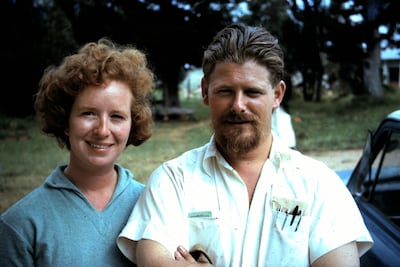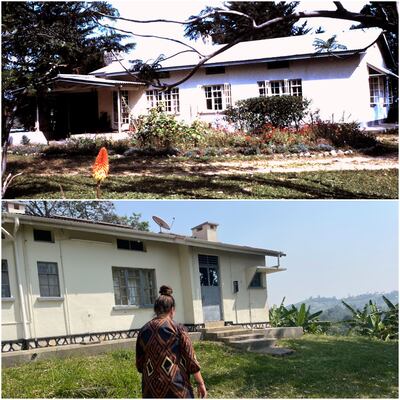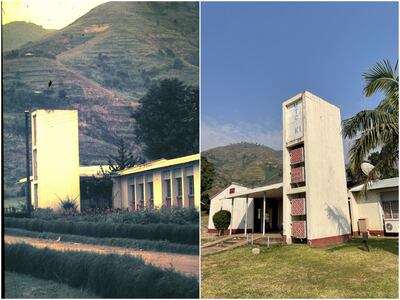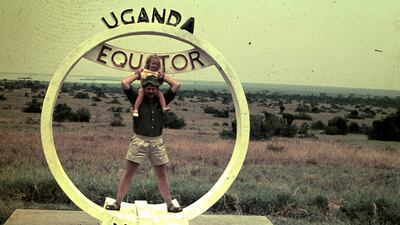It was an idyllic childhood. When I was just six weeks old, my mum and dad packed me up and the three of us sailed for Uganda. For my mum, it was her first time out of Scotland and I was her first child. I can only imagine the adventurous spirit that led her to leave to teach in Africa.
My early memories are all of the mountains, and the colours green and red. The green of the forests and the matoke (savoury banana) plantations and the red of the fertile soil. My parents were teachers at the Kichwamba Technical College in the foothills of the Rwenzori Mountains — the Mountains of the Moon. We lived in the college compound with the other teachers and the young men who came to study there.
I was allowed to run wild. Barefoot I would skip through the compound, hunting for tadpoles, hiding under the huge fir trees and dodging the occasional snake.
My early education was from my mum, who taught me to read when I was about three. My outer and inner-worlds mirrored each other; both magical and full of discoveries. Later, I was sent to school. It was one room for all ages and our teacher was Mrs Gilfillan. At the bottom of the school yard was a forest and black-and-white colobus monkeys used to come and sit in the tops of the trees to jeer at us and throw missiles down.
At the weekends, we would jump into our car and drive down the murram escarpment to the game parks of the Semuliki National Park plains, which we could see from our garden.
Wildlife was not under threat in those days. Thousands of antelope and zebra galloped ahead of the car. We saw herds of giraffe and water buffalo, sometimes startled into violent action by a cheetah. One day we had stopped the car to watch two male kob antelope fight. Their long horns were enmeshed. Suddenly a lioness sprang from the cover of our car and leapt on to the back of the smaller one. He had no chance and was dragged to the ground and quickly dispatched. I hid under the seats, horrified by the brutality of nature. Then we waited as the whole family arrived to feast with a magnificent, maned patriarch and a litter of cubs.
But there was a dark shadow looming. Idi Amin had seized power and his army was rampaging across the country. Opposing tribes were massacred and fear gripped the country. By now I was eight and my brother four, and my parents decided it was time for us to get educated in Scotland. We packed up our house and said goodbye to everything I had ever known.

Scotland was a different world. My dad had got a job at Oban High School in the Highlands. For a while, we lived in a tent because money was very tight. This at least felt familiar, as we had always spent long summers camping at Mombasa on the Kenyan coast. People were kind to us. My mum, who was a beauty and had a halo of red hair, used to go down to the docks as the fishermen came in and they would fill her bucket with herring for free.
But for me, everything was different. Rain instead of sun, grey instead of blue, white faces in place of African ones, and a school where my non-Scottish accent and good reading made me an oddity.
My childhood in Africa became like a dream. A lost world. A hole in my heart.
Fifty years on, I returned to Uganda, to climb the volcano Mount Elgon in support of the charity Salve International, who get street kids off the streets and back to school.

I decided it was time to try to find my childhood home. My driver, Ibra, and I set off on the three-day journey from Jinja to Fort Portal, stopping to take in the game parks on the way. Once again, I watched elegant giraffes come to drink at the water hole and fed pineapple skins to the mischievous warthogs at Lake Victoria. All my senses tingled with recognition.
I had very mixed emotions about the journey. When I googled the school, I discovered that in the nineties it had been attacked by rebels from the Democratic Republic of Congo. They had captured more than 100 students and then burnt alive those sheltering in the dormitories. What would I find?
When we drove up, the army was at the gate, but when I showed them my dad’s old photos, all doors were opened to me. Aaron showed me around, his grandfather had worked there when my parents had.
The first thing we found was the old staffroom, still there and still being used. The building had survived intact. The college was thriving. Students strolled under the trees chatting or on their mobiles and the classrooms I peeked into were well equipped and buzzing with activity.

I saw where I used to collect tadpoles and the steep embankments I would jump off into the puddles. Then Aaron guided me up a hill past the dormitories. My heart lurched in recognition as my house came into view. The big tree at the back door had been cut down, but it was my house.
Tears and smiles fought with each other. I walked round to the front garden and there were the trees that feature in every family photo we have. I looked out over the escarpment and down to the Semuliki plains. This is the view that has remained with my 86-year-old father. He has Alzheimer’s disease now, but he still talks of the mountains and the plains reaching all the way down to the Congo.
I WhatsApped my parents and shared the experience with them over video. Ibra and Aaron greeted them like family members. My dad delighted as he looked out once again over the view he loved so much.
My childhood had been real after all, not just a dim dream. I had come back to find a country more prosperous than when we had left. The college had survived the attack on it and rebuilt and was now preparing a new generation.
I felt that hole in my heart healing and happiness creeping in as I looked around my old home and the crickets sang triumphantly from the long grasses.

